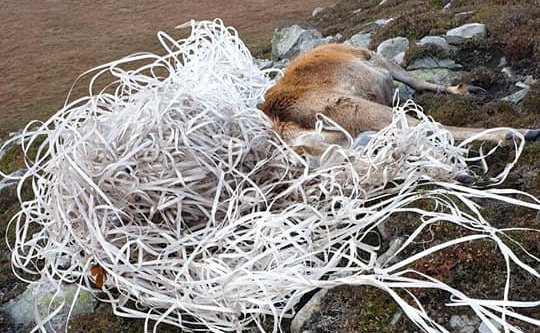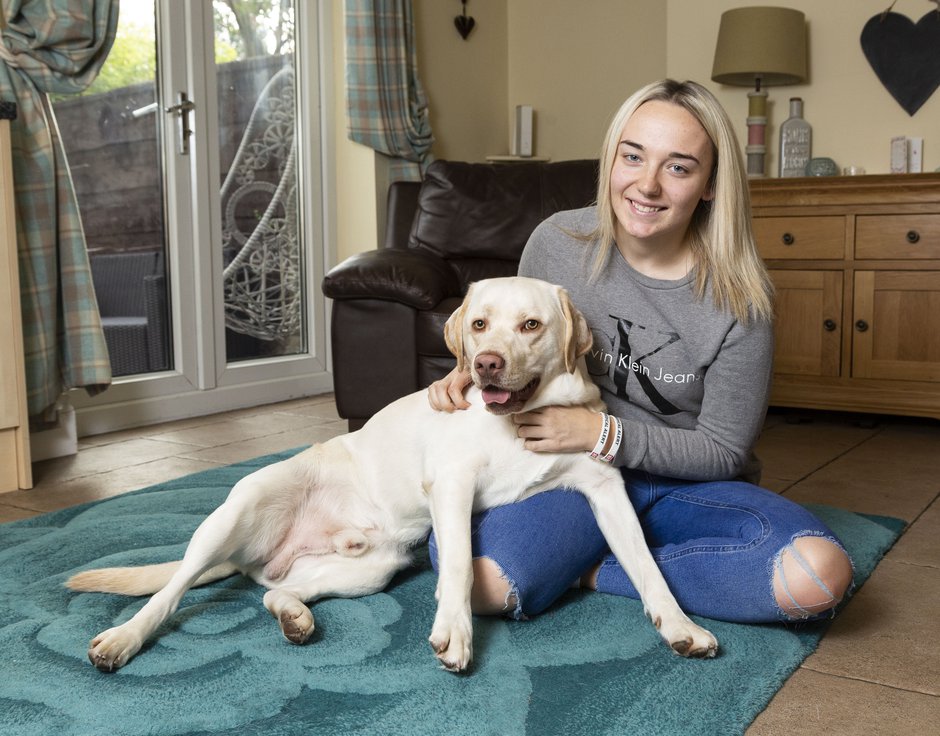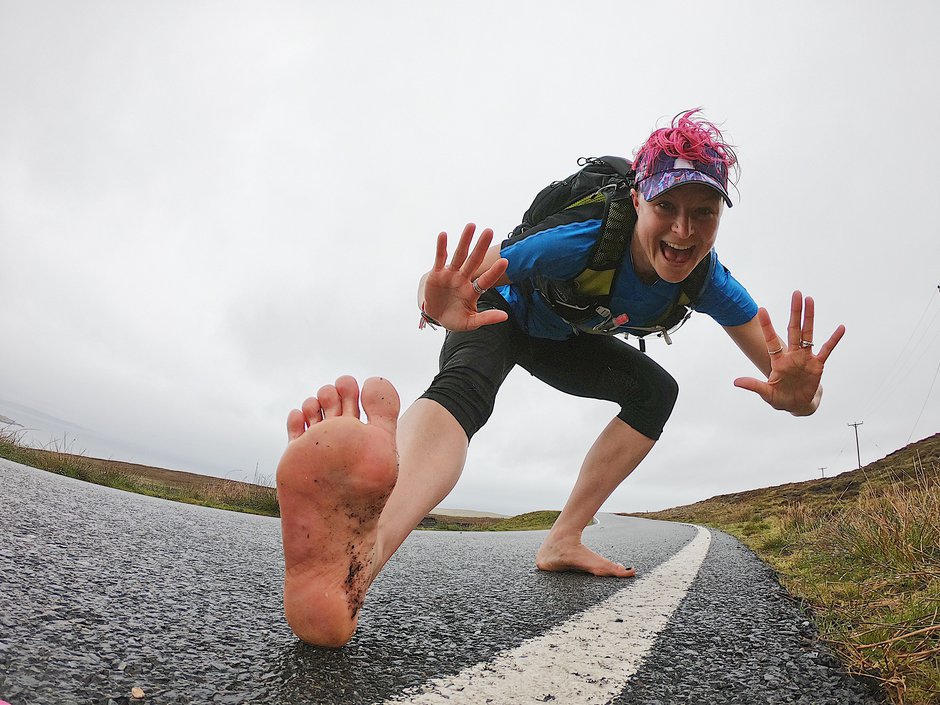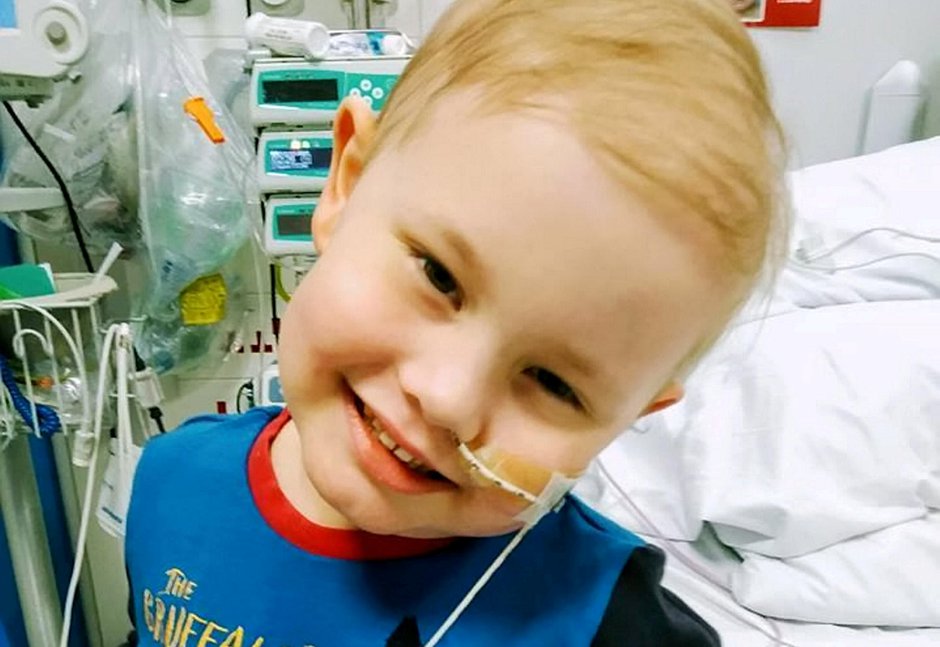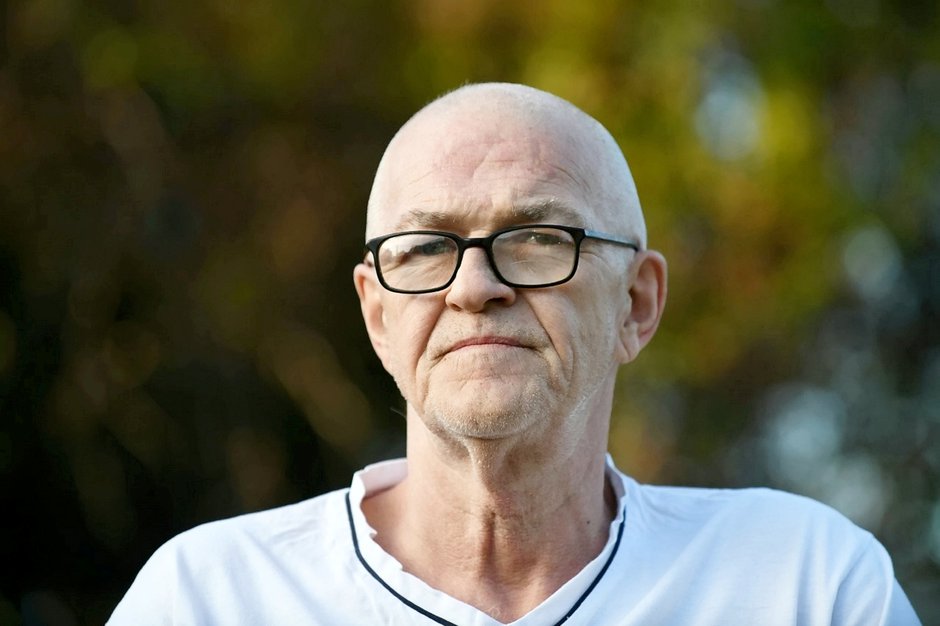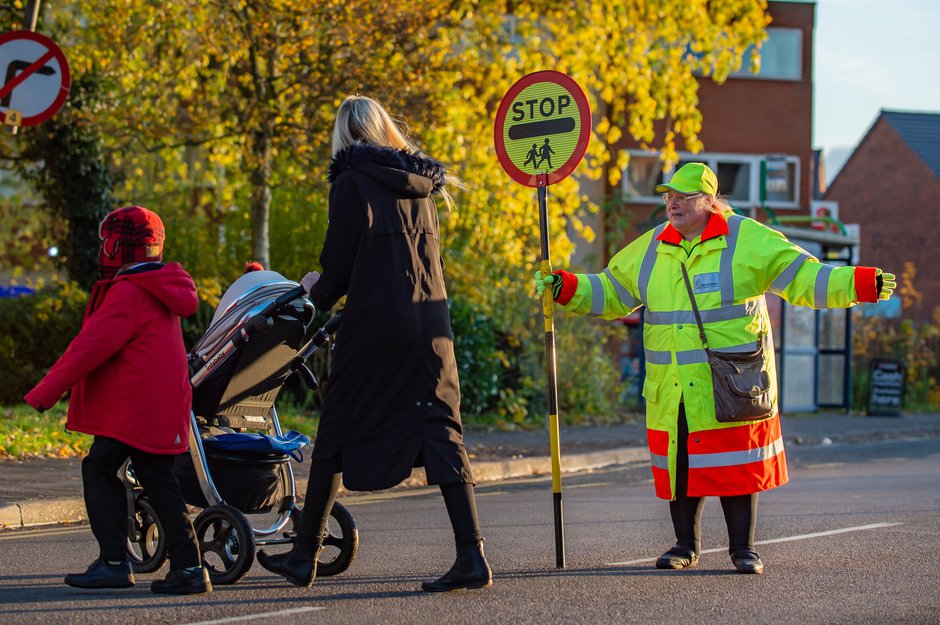AFTER LIFE - A retired model is hoping her body will continue to help when she has gone by donating it to science - after posing in the nude while well into her seventies
 Image by: KM Group
Image by: KM Group
A retired model is hoping her body will continue to help when she has gone by donating it to science - after posing in the nude while well into her seventies.
Yvonne Vinall spent more than 30 years undressing as a nude life model, "wearing nothing but a choker and a smile."
But now the 86-year-old has vowed to continue helping people well after she has gone, by donating her body to the London Anatomy Office.
A risque portrait of Yvonne is said to have been mounted in Clarence House, home to the late Queen Mother.
The widow, from Tunbridge Wells, Kent, said: "I did a lot of work over the years, and towards the end much of it was private, where I wouldn't get paid in cash but I'd get the painting itself, which was much more valuable.
"Artists don't look for superficial beauty - they might focus on a particular body part such as a hand or a foot.
"Ultimately though, it's in the eye of the beholder, as they say.
"Eventually I became a bit bored of doing the same thing and I wanted to quit while I was on top."
 Image by: KM Group
Image by: KM Group
In future, her body is going to be used to help educate medical students, after she received a certificate confirming her donation to the London Anatomy Office.
She said: "How on Earth are students going to learn and pass their exams unless they have a human body to look at?
"I might still feel like a mischievous 18-year-old inside, but I have a pacemaker, I've had my cataracts done, and I have false knees, hips and shoulders.
"When they get me on the slab, they will have an awful lot to work with."
Kings College London says anyone older than 17 can donate their body, and while there is no upper age limit, there is no guarantee a donation will be accepted.
Yvonne, who was 40 when she first started life modelling, added: "I think people are frightened of talking about death and scared of dying itself.
"I'm not at all scared, although all my friends say God will probably keep me down here for as long as possible."
FOAM GOAL - Children in a seaside town have been given FOAM footballs to play with - after complaints normal ones cause too much damage
 Image by: Simon Galloway
Image by: Simon Galloway
Children in a seaside town have been given FOAM footballs to play with - after complaints normal ones cause too much damage.
The kids were hit with a 'no ball-games' policy on their street after residents said wayward shots were smashing into cars and homes.
It meant football-mad youngsters had nowhere to play as there was no designated area for the sport nearby.
But children in Hawke Close in Newquay, Cornwall, have now been given special foam footballs so they can keep on kicking.
The move was thought up by the housing association LiveWest who became worried that outdoor playing time would be reduced.
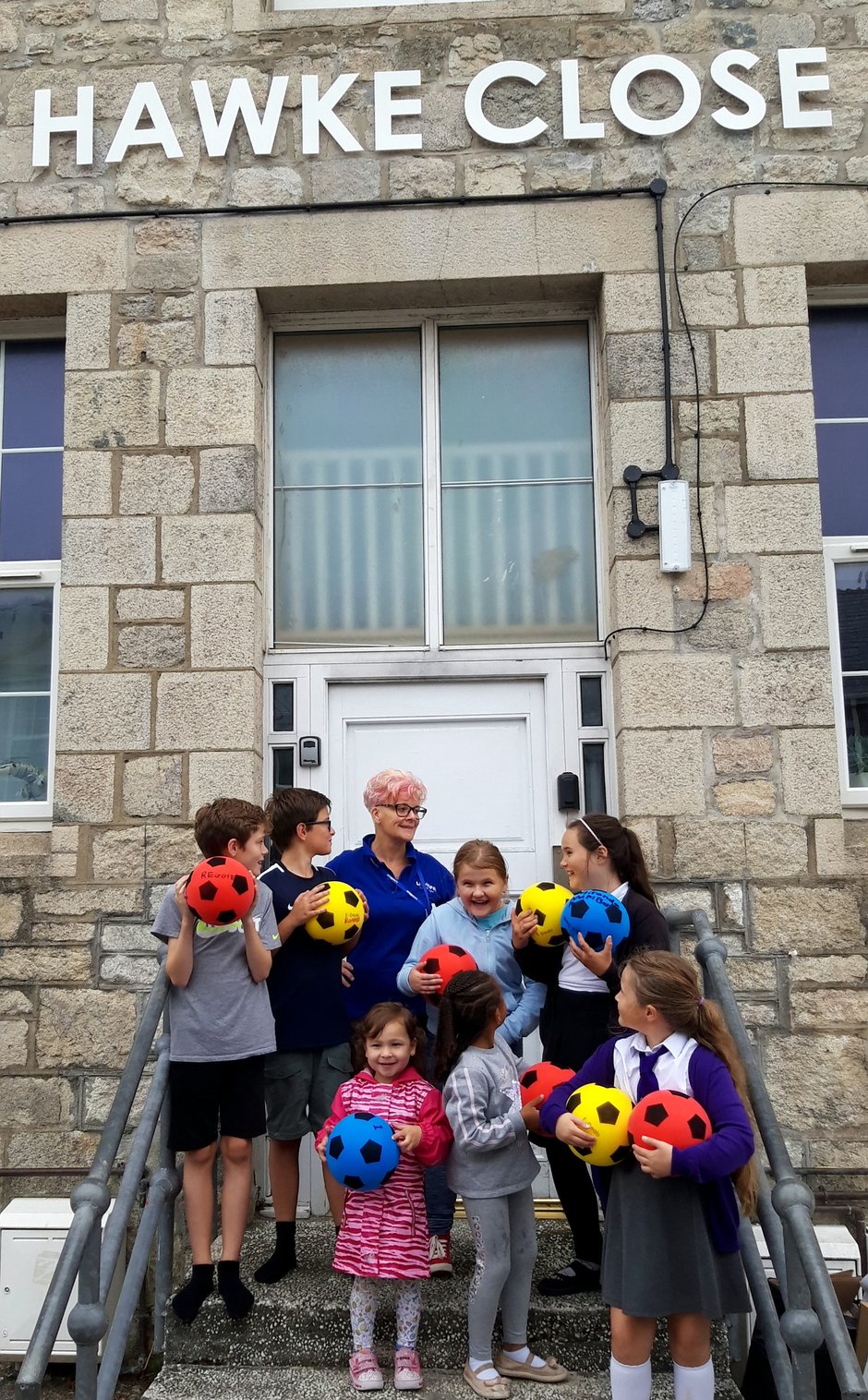 Image by: Simon Galloway
Image by: Simon Galloway Image by: Simon Galloway
Image by: Simon Galloway
Community connector Mai Evans said: "We wanted to see if we could find a practical solution to the safety issues of footballs at Hawke Close.
"So we held a community engagement event with the residents to listen to their ideas and views.
"We came up with the idea of buying some lightweight, low-density foam footballs which would allow the younger children to carry on playing football.
"The feedback has been really positive."
Housing officer Kirsti Challenger added: "Foam footballs were given to all of the children at Hawke Close along with reinforcing the message that playing football in the main car park area was not allowed and that other hard balls are not acceptable either.
"The foam footballs make it easy for them to have a kick around.
"The light weight of the balls means the children can have fun playing safely in a confined space without causing damage to any property."
STAG KILLED BY PLASTIC - These shocking pictures show a stag found with its antlers wrapped in a mass of discarded plastic strapping
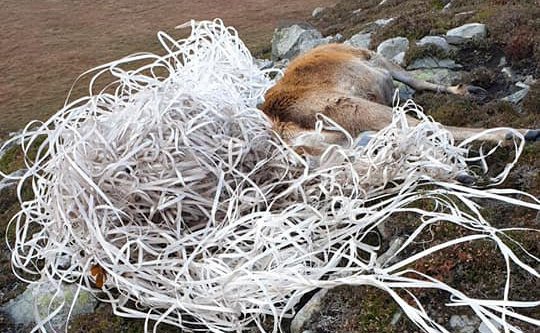 Image by: Matthew Newby SWNS
Image by: Matthew Newby SWNS
These shocking pictures show a beautiful stag which died after it was found with its antlers wrapped - in a mass of discarded plastic strapping.
The distressed animal was discovered tangled in the plastic waste on a hillside on the west coast of Jura, Inner Hebrides, yesterday (Wed).
It is thought the stag had been grazing on seaweed on the idyllic island's shoreline when the plastic banding caught on his antlers.
He then walked around a mile onto the hillside, where he has been starving for the last week as the plastic was wrapped around his mouth.
The beautiful animal was discovered by shocked gamekeeper, Scott Muir, 32, who said the stag sadly had to be put to sleep.
Scott, who has lived on the island - with a population of just 230 - all his life, said plastic pollution on the coast has increasingly worsened in the last five years.
He said: “I was walking over the estate when I saw the plastic waste and realised there was a stag caught.
“I thought it was dead at first but as I approached it I could see his head start to move.
“These can be 18st animals and I know how powerful they can be, but he looked tired and stressed and he couldn’t see because the plastic was right around his antlers.
“He wouldn’t have been able to graze either as it was right over his mouth, so he was effectively starving.
“He would have been down at the shore grazing on seaweed, like a lot of the stags do, and as he has had his antlers down they have caught in the plastic banding.
“It looks like he has then walked about a mile up onto the hillside, no mean feat considering it was tangled around his back leg as well as round his antlers.
“I think he has been there for about a week. In the end the animal had to sadly be dispatched.”
 Image by: Clemens Weiss
Image by: Clemens Weiss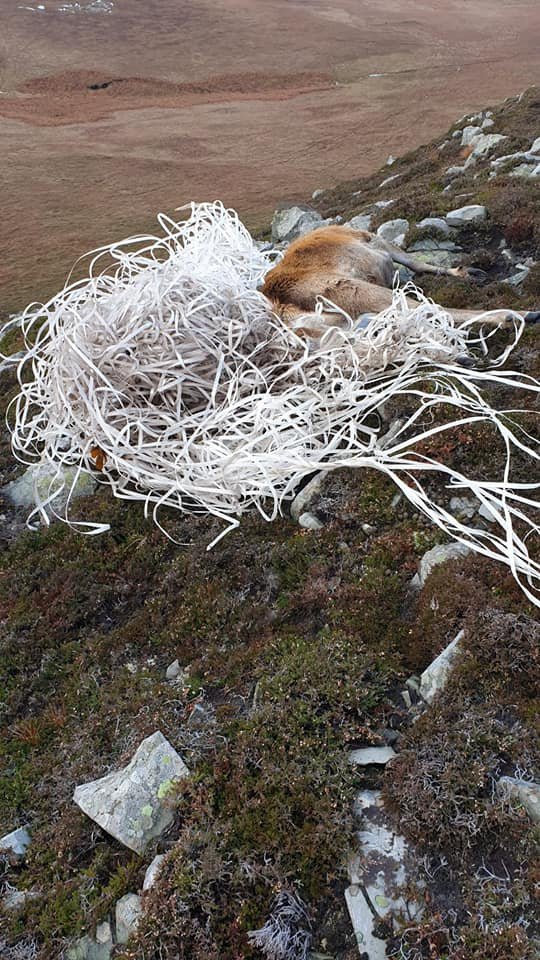 Image by: Matthew Newby SWNS
Image by: Matthew Newby SWNS Image by: Matthew Newby SWNS
Image by: Matthew Newby SWNS
Scott is also a volunteer with Wild Side of Jura, a group aiming to protect the west coast and raise awareness to stop plans for a potential fish farm being built.
Scott said: “We are a group of five or six volunteers who came together to protect the west coast of Jura and raise awareness of a fish farm which is trying to be built here.
“The plastic pollution is getting worse. We have seen an increase in plastic waste on the west coast in the last five, six years.
“The plastic on the stag is not fishing net but plastic banding which is used in conjunction with fishing.
“We can’t categorically say where it came from but I'd be willing to bet some sort of commercial fishing, fish farm, which is what we are trying to stop on the west coast of Jura.”
Anger locals took to social media to voice their outrage.
One said: "That's shocking, poor animal, the thought of him struggling with that for hours makes me so angry.
"So much plastic out there, it makes it much more of a reality when you see the damage it does so close to home."
Another said: "Poor thing, what an awful sight. I can’t believe how loosely regulated boats are it’s dreadful."
Someone else added: "Whoever threw that, and more, overboard obviously do not care about the consequences of their actions.
"Out of sight, out of mind. What a terrible plight for an innocent creature."
WOMAN'S BEST FRIEND - A young woman who suffers up to 100 seizures A DAY has revealed she's regularly rescued by her dog - who can recognise her distress despite never being trained
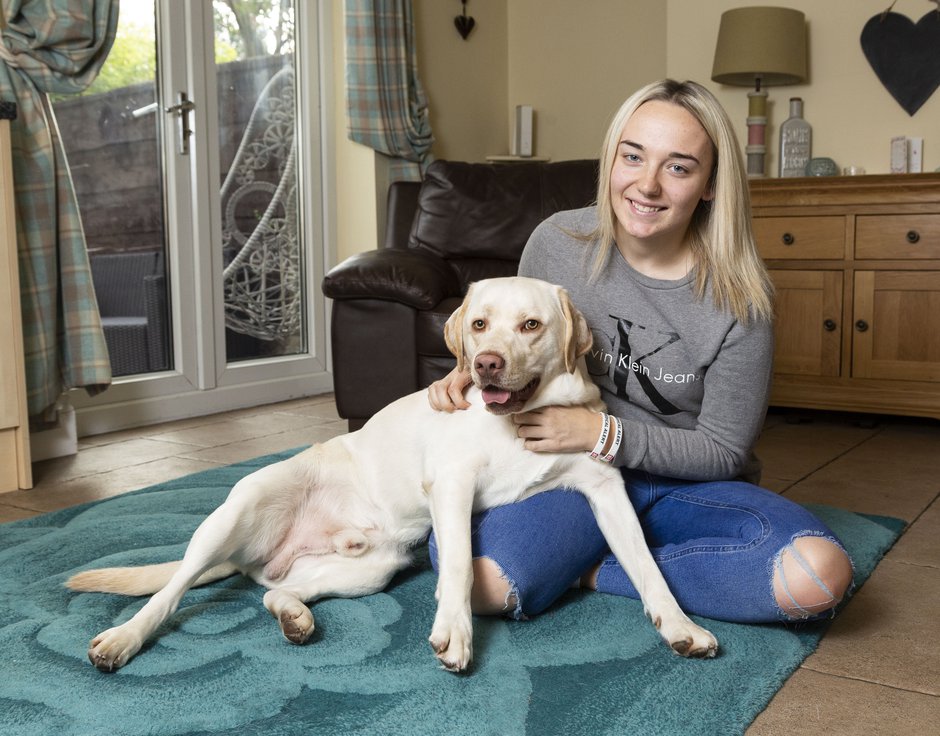 Image by: Lucy Brown
Image by: Lucy Brown
A woman who suffers up to 100 seizures a DAY is regularly rescued by her DOG - that can recognise her distress despite never being trained.
Lucy Brown gave up her job and lost her freedom after being struck down by non-epileptic attack disorder (NEAD).
The condition has forced the former carer to leave the house she shared with her boyfriend of five years and move back in with her parents for her own safety.
Brave Lucy, 20, said she has also had to sign on for benefits and has lost several friendships since being hit by NEAD as she can't drink or go out.
But one thing has kept her going through the difficult times - her pet dog Freddie.
Despite no training Freddie acts like a seizure dog - whenever she fits he licks and paws at her and brings her round.
The two-year-old Labrador acts as Lucy's safety net, keeping her out of harm when there is nobody else around.
She said: "He does what seizure dogs do - he licks me and paws me to bring me round but has never had any training.
"He's the main reason I moved back home. He will help me when I'm on my own. He's my dog - I got him as a puppy. He's always by my side and will just lie with me.
"I can't remember the first time he helped but, from what I’ve been told, he just ran straight over to me, starting licking my face and cuddled his body into me."
Lucy, from Warrington, Cheshire said she first suffered seizures when she was in her mid-teens but they quickly disappeared.
However, the condition returned with a vengeance at the start of 2019 - turning her life upside down.
Although doctors initially thought she had epilepsy medication prescribed to her put her in hospital - leading staff to run a series of tests that eventually led to NEAD.
Symptoms include convulsions and loss of bladder control - all epilepsy-like indicators.
She said: "It's just been getting me depressed - losing my job and everything. Everyone is moving on with their lives and I'm held back.
"It's very lonely. I don't really do much. I can't even have a bath alone.
"I average about ten seizures a day, although it was up around 100 in February. They range from staring into space to full-on fits.
"I have to make sure I'm in a safe place. A couple of times a month they go above 20 or 30 a day.
"The seizures don't really have a trigger.
"When I first started having them I was still going out and I would always get them when I got home, so I thought it could be the lights.
"Car headlights always look like they are on full beam, too. But I still don't think that's right."
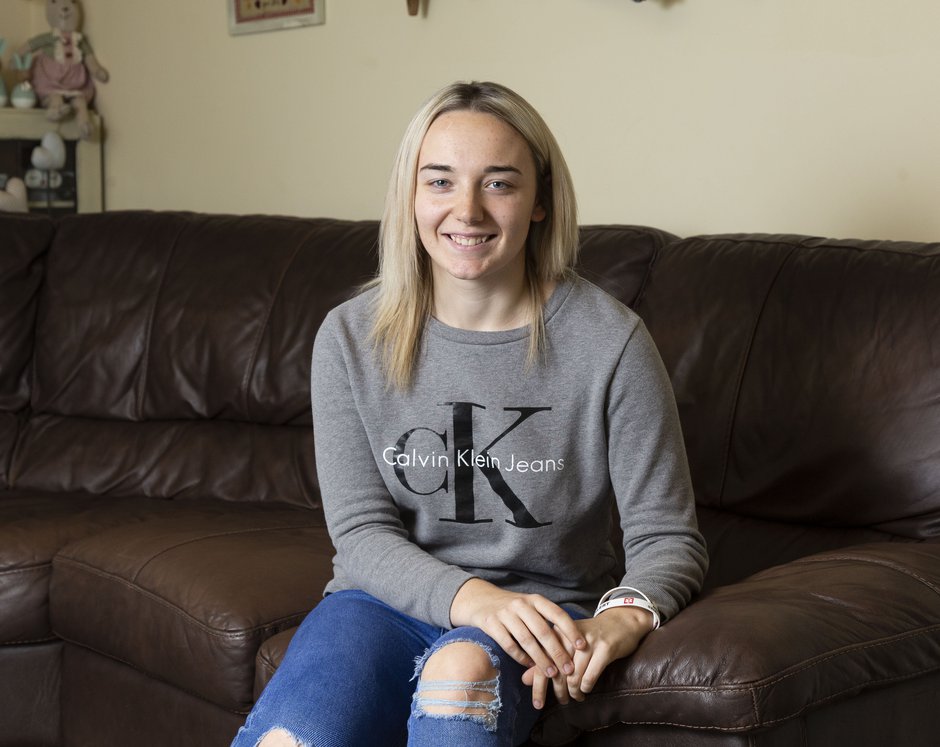 Image by: Lucy Brown
Image by: Lucy Brown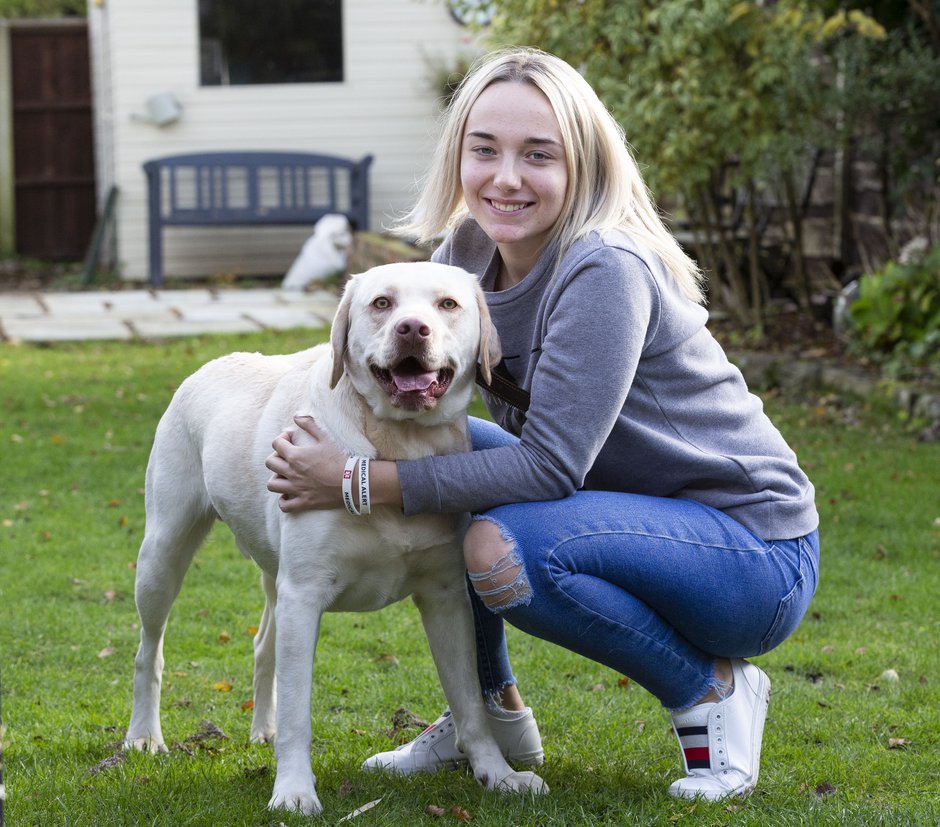 Image by: Lucy Brown
Image by: Lucy Brown Image by: Lucy Brown
Image by: Lucy Brown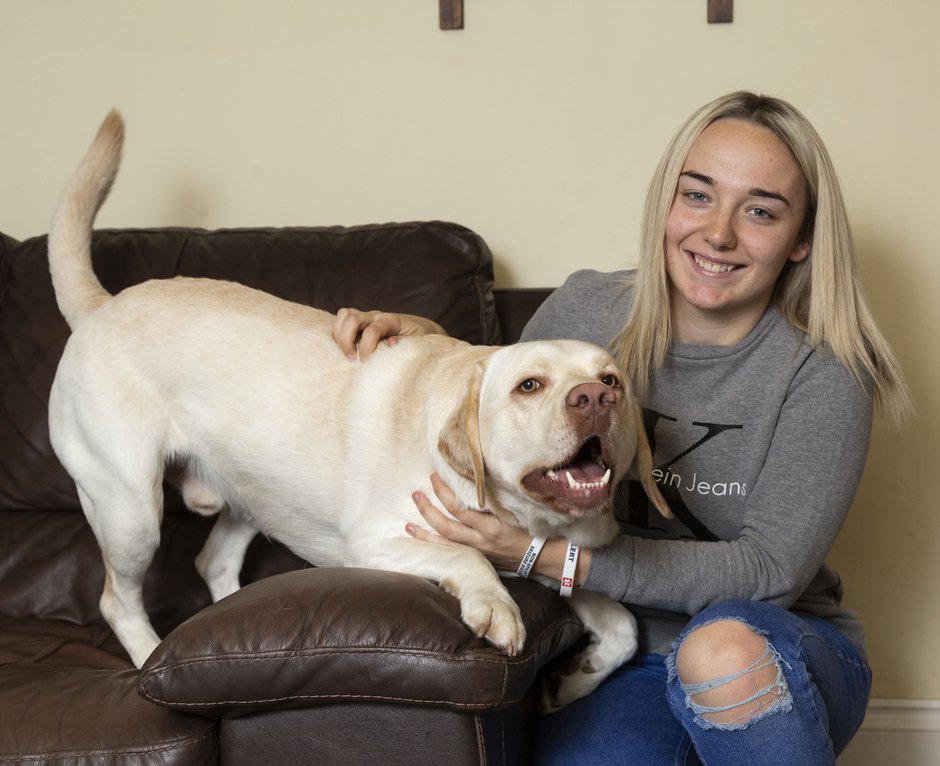 Image by: Lucy Brown
Image by: Lucy Brown
Plucky Lucy said her partner Bradley, 20, has been great.
But the condition has meant she can't go out and drink anymore - meaning she has drifted away from some people.
She said: "It's just embarrassing going out. Socialising is just no good as you're in fear of having one [a seizure]. I've lost a lot of friends.
"Friends use to invite me to go out but due to so many last-minute cancellations they naturally stopped asking.
"I get occasional texts off of a couple of people but I just have lost contact with a lot as I rely on others. I won’t go anywhere on my own."
Lucy said the attacks can strike at any time - and there's no telling when they might stop.
She said: "I might have to live with [NEAD] for the rest of my life. But it could also stop tomorrow. I've got some other health problems - I'm going through some tests at the moment.
"They want to rule out epilepsy completely although I'm already sure it's not. They have to be 100 per cent sure as if you're not on medication it can damage your brain."
Stoic Lucy now wants to speak out to raise awareness.
It is estimated that around 15,000 people in the UK have the condition, according to a NEAD support website - although that figure could be much higher.
She said: "A lot of people get diagnosed with epilepsy and actually have NEAD. It's about awareness.
"Epilepsy drugs are really toxic for your body so it's not good to be on the medication [if you don't need them]."
Lucy has tried counselling for the condition but, aside from that, said there is not much that can be done - including surgery and other treatments.
Sadly, she said: "Counselling was the only option for me."
Video by: Lucy Brown
SOLE DESTROYING - A super-tough adventurer has completed a historic feat of endurance - running 2,620 miles across the UK BAREFOOT
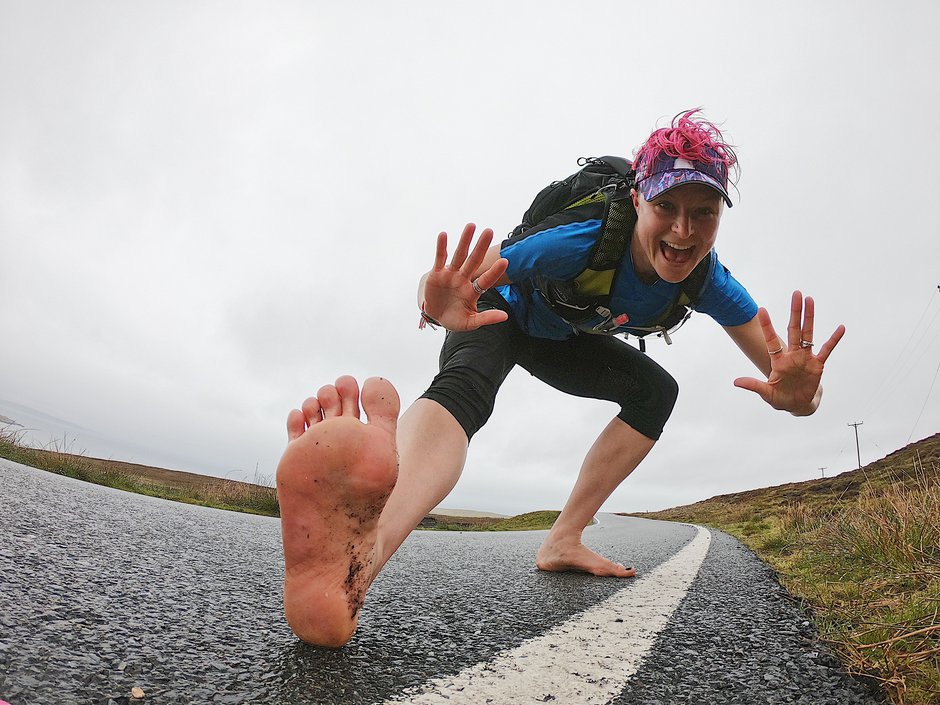 Image by: Adam Harnett
Image by: Adam Harnett
A super-tough adventurer has completed a historic feat of endurance - running 2,620 miles across the UK BAREFOOT.
Anna McNuff set out from the Shetland Isles in June 2019 and, after 2,620 miles - the equivalent of 100 marathons - reached the finishing line today (Sun).
The intrepid explorer, who has previously cycled through all 50 US states and run the length of New Zealand, has been obsessed with running without shoes for a while now.
Tough Anna crossed the line, in Cannizaro Park in Wimbledon, south west London, at round 2pm, completing her 'Barefoot Britain' challenge.
Anna said: “It’s been a wonderful, weird, difficult and extraordinary five months.
"I have stepped in poo, glass - and even on a dead rabbit. You don’t have to run 100 marathons barefoot to have an adventure.
"But you do have to take that first step out of your comfort zone. I know that if girls can take those first adventurous steps, then they'll see what they are truly capable of.”
Before setting off, she said: “I’ve had a quiet obsession with minimalist running for a few years now, ever since I read Born to Run and spent time in New Zealand - where many of the kids run around barefoot.
“Feet are quite the complex machine, with over 7,000 nerve endings in each sole and 26 bones in each foot.
“This adventure is a huge experiment – I’m looking to see if I can coax my feet into doing what they were truly built to do, after a lifetime of being squidged up in shoes.”
Both of Anna’s parents were Olympians, and she grew up wanting to follow in their footsteps.
She went on to row for Great Britain, winning a bronze medal at the 2007 European Championships.
But, dogged by injuries in her twenties, she decided to retire and embark on a new life as an adventurer, travelling the world in pursuit of new and daunting endurance challenges and writing two books in the process.
Anna is an ambassador for UK Girl Guiding, and a central part of her mission is “to show the young women of Great Britain that there is more magic in them than they will ever know.”
Throughout her run, she stopped off to talk with groups of Girl Guides across the country, speaking to them about “ the joys of adventure and the great outdoors”.
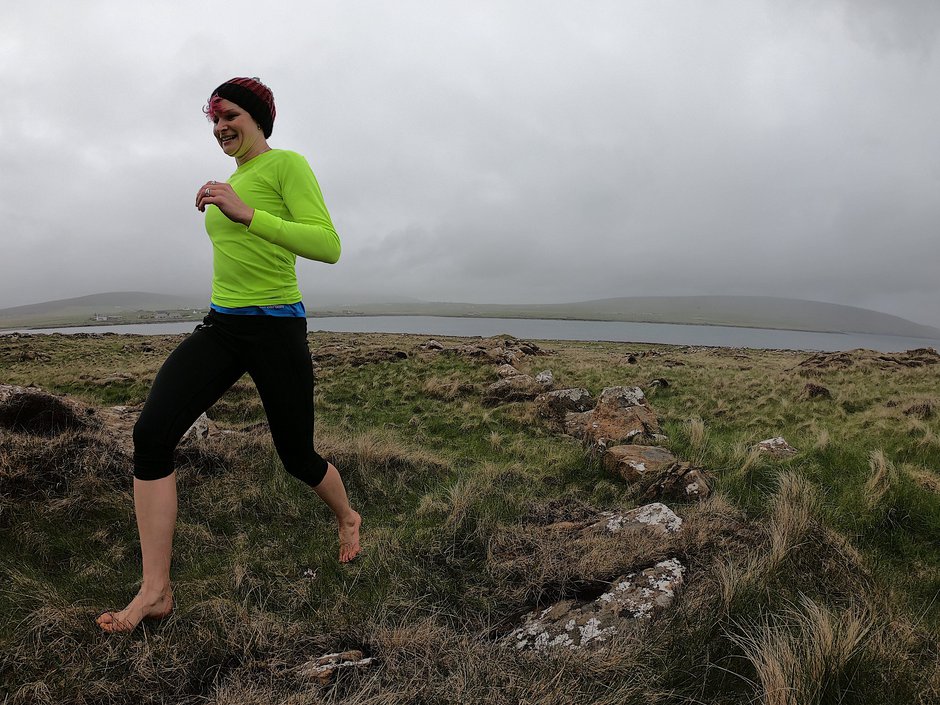 Image by: Adam Harnett
Image by: Adam Harnett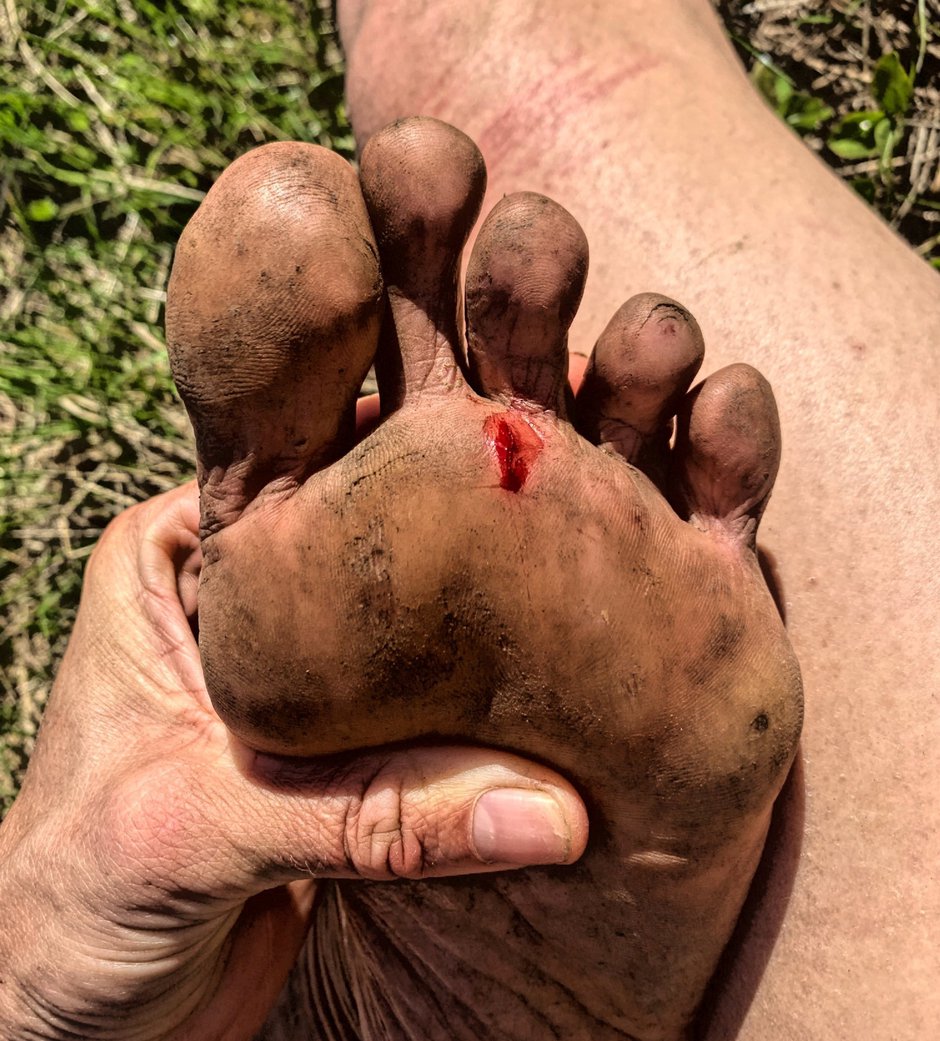 Image by: Adam Harnett
Image by: Adam Harnett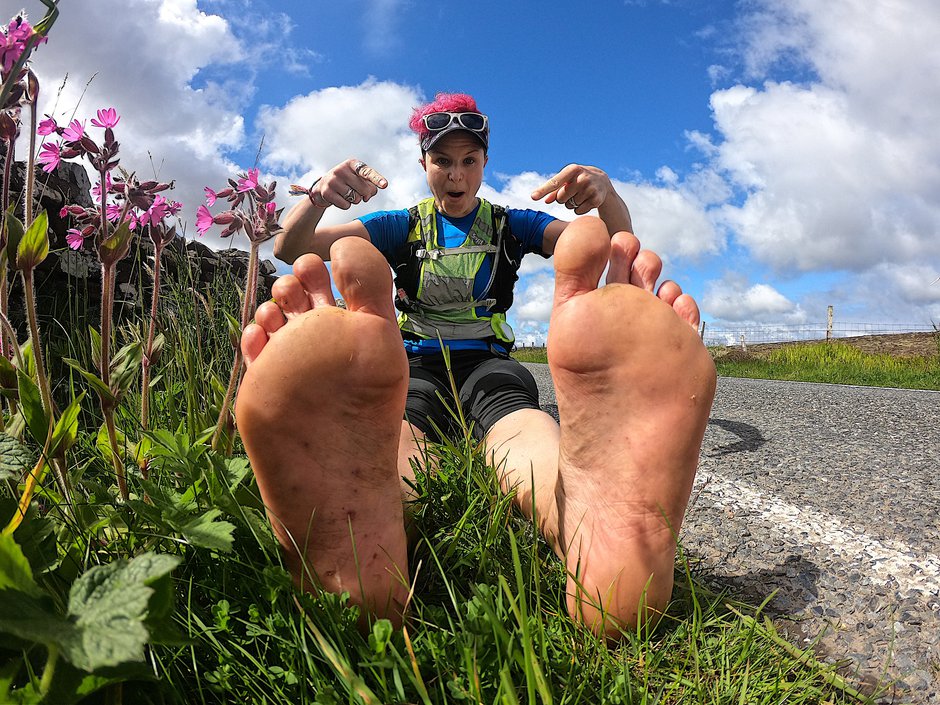 Image by: Adam Harnett
Image by: Adam Harnett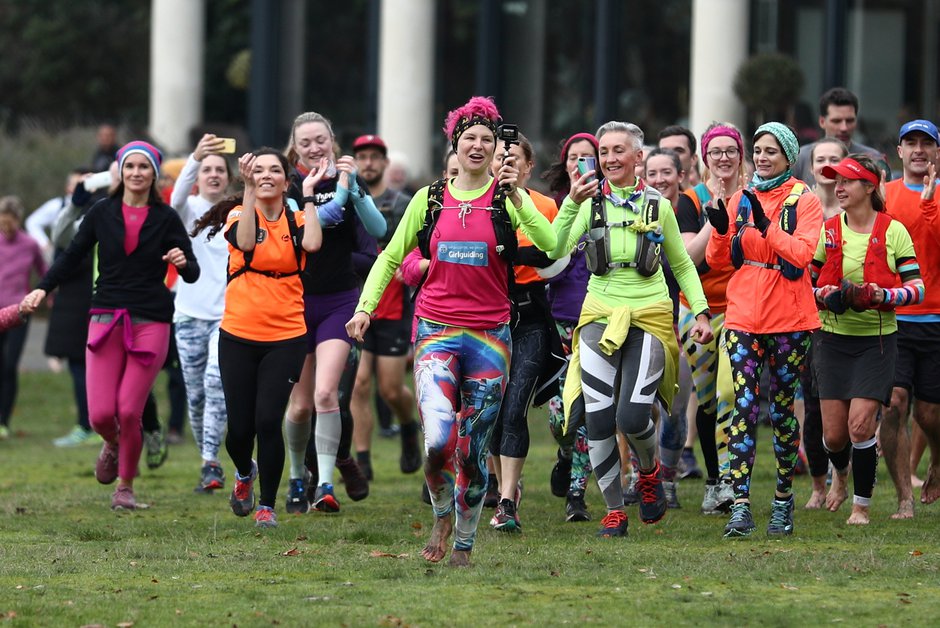 Image by: Adam Gray SWNS
Image by: Adam Gray SWNS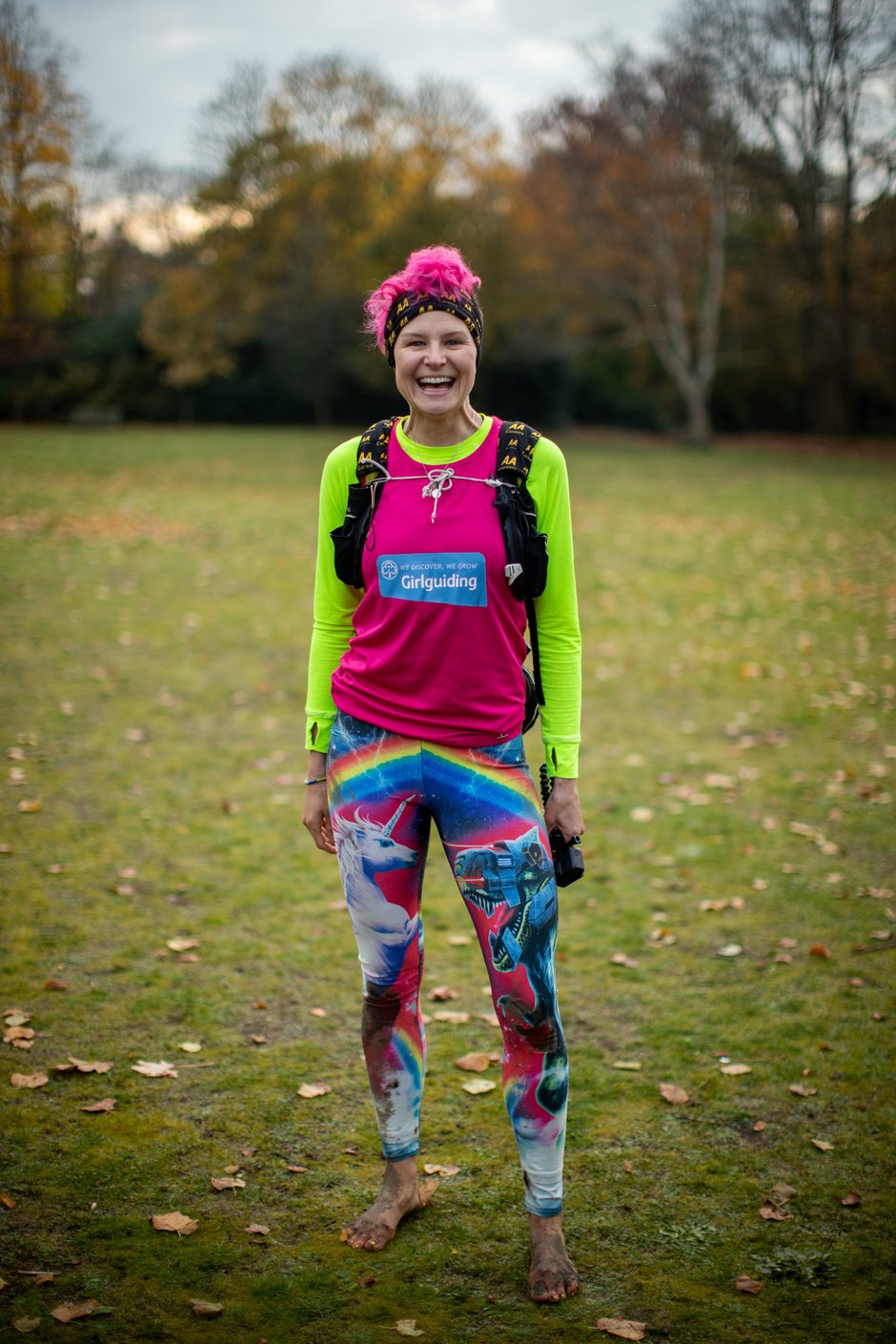 Image by: Adam Gray SWNS
Image by: Adam Gray SWNS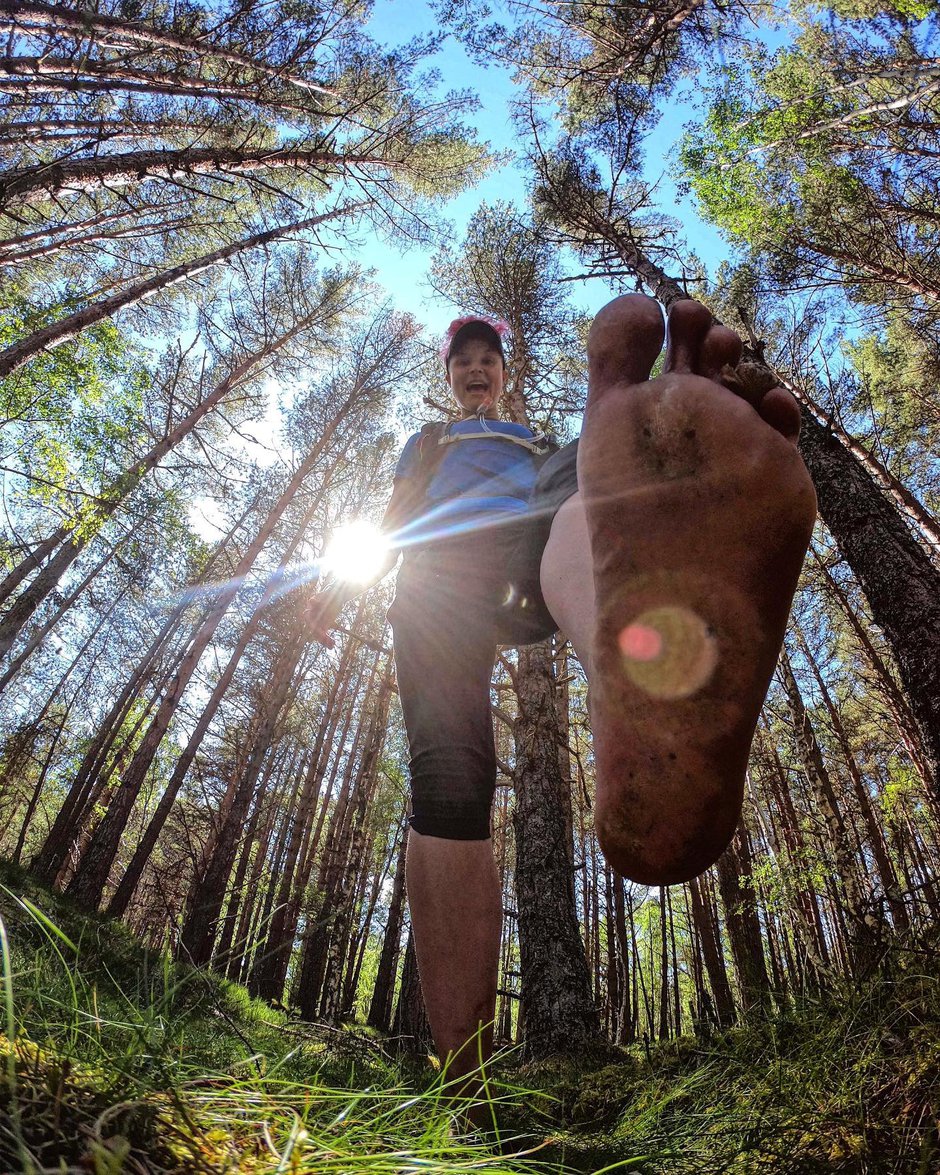 Image by: Adam Harnett
Image by: Adam Harnett
She said: “I wanted to show girls they can do anything.
"That’s why I’ve run the length of the UK in my bare feet – to show girls and young women that taking risks and doing things that scare them, big or small, can be incredible.
"And being a girl should not stop you from doing anything. I have spoken to thousands of girls in all over the UK and my message has always been ‘be bold, be brave and be you.’
"The girls are always so eager to see my feet and surprised that they don't look all that different to their own – mine just have a bit more dirt on them."
From the Shetland Isles, Anna’s run - which took five months - took her down the northeast coast of Scotland towards Inverness, before heading down to Glasgow and Edinburgh via Aberdeen.
Her route then took her across the border to Newcastle, through the Pennines to Yorkshire before heading to Liverpool and catching a ferry to Belfast.
After running along the Northern Irish coast, she took a ferry back to Wales and headed towards Nottingham, eventually heading down to Bristol and the southeast.
The last legs of her journey saw her cross over to the Isle of Wight, before heading up through Surrey towards London.
Anna encouraged supporters to help her out on the way, either by offering to transport her bag for a stage of the run, giving her somewhere to stay for the night or running alongside her.
She said: “Adventures are about a quest for growth. I figure that if I’m going to stand in front of young girls around the UK and encourage them take on challenges that they believe to be just beyond their reach – then I have to be on that journey too.”
Asked before she set out what she would do if she stepped on glass and cut her foot, Anna said: “I don’t know yet. But I figure I can only control the controllable.
“If I get injured or step on a broken Irn Bru bottle in the outskirts of Glasgow, then I will deal with that then.”
Her adventure has even baffled her own mother.
Anna added: “She thinks I’m bonkers. But then again she’s bonkers too and she raised me to believe in what is possible, rather than focus on what isn’t.
“Therefore, really - this is all her doing.”
A man was hospitalised for three months and lost the use of his legs - after a PARASITE crawled up his penis when he was swimming in a lake
 Image by: James Michael
Image by: James Michael
A traveller spent three months in hospital and lost the use of his legs after taking a dip in a lake - when a parasitic worm swam up his penis.
James Michael, 32, went swimming in Lake Malawi in southeastern Africa with pals two years ago, but had no idea and had no idea a parasitic worm had burrowed into his privates.
The parasitic worm laid eggs inside him, which slowly made him so ill his immune system went into overdrive, and attacked his spine.
The marketer was hospitalised for three months while medics fought to get the infection - bilharzia - under control, giving him only a 30 per cent chance of a full recovery.
But after a stint in a wheelchair, suffering digestion and toilet problems, and using crutches for four months he has finally made a full recovery.
James, from Kensington, central London, said: "When I look back at photos from my time in Africa, it's weird to think that's where the parasite crawled up my penis.
"That wasn't exactly how I imagined the trip of a lifetime with my friends going - the whole experience was surreal and strange.
"Plotting a line, it was like going straight from a paradise beach to a hospital bed, almost incapacitated and helpless.
"This journey has made me definitely think more about my health and about how I look after myself - like reading up on health risks when I travel.
"I would urge anyone thinking of getting into Lake Malawi not to.
"It's just not worth the potential risks of a little worm climbing in your body through your parts. It's a grotesque, sickening thought.
"This has been horrendous. It's felt like a never-ending mountain I've had to climb."
James went on the "trip of a lifetime" to Africa with three mates back in August 2017.
They travelled from Zambia to Zimbabwe, before visiting Malawi for five days.
The group of three swam and canoed for three hours a day every day in Lake Malawi - before jetting back to the UK.
"Even though I contracted the infection then, nothing happened and I was able to leave for home thinking nothing was wrong," he said.
In October 2018 James began to notice a loss of feeling in both his legs, and initially thought it was fatigue from cycling.
"I supposed it was just from the exercise, so didn't worry about it," he said.
"But the feeling of fatigue never shifted, and actually got worse that month."
But it got worse over the course of a few weeks, until it was taking him five minutes to climb up 15 steps to his flat.
 Image by: James Michael
Image by: James Michael Image by: James Michael
Image by: James Michael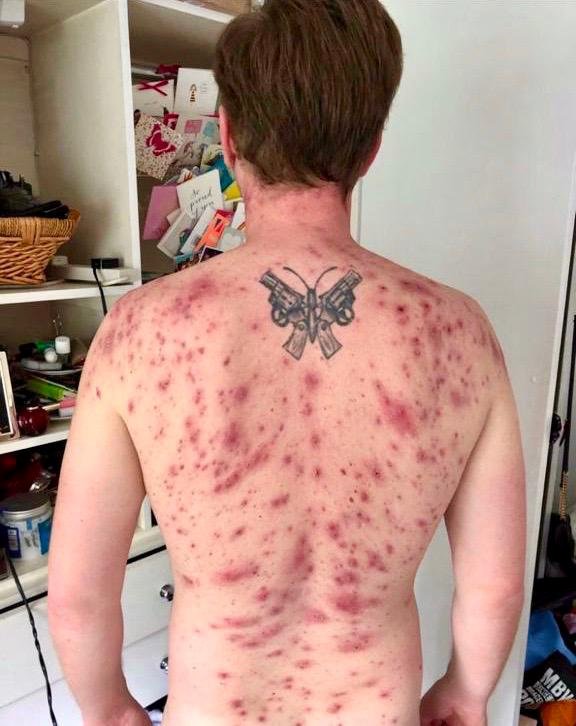 Image by: James Michael
Image by: James Michael
He went to Chelsea and Westminster Hospital in November 2018 when he woke up sweating uncontrollably, and started to worry he had MS or motor neurone disease.
Worried James was given antibiotics and sent home, but still felt terrible, and a week later, with the loss of feeling increasing went back to hospital.
"I explained to them that something serious was going on," he said.
"I went to the neurology department, and they did blood tests to see what was up.
"They determined quite quickly that my immune system was attacking my spine, leading to the loss of control of my legs.
"I was put on a six-month course of steroids to counter this, but they didn't actually know what had caused this."
Tests revealed his immune system was attacking his spine, and he eventually totally lost the use of his legs due to a combination of pain and loss of feeling.
Doctors from the Hospital For Tropical Diseases told panicked James that a parasitic worm had crawled up his penis and laid eggs in his body.
A week before Christmas he was diagnosed with bilharzia - an infection caused by a parasitic worm which lives in fresh water in subtropical and tropical regions - and given suitable medication.
He said: "That killed the infection but I was left basically debilitated.
"They told me there was a 30 per cent chance I'd make a full recovery - ten years from now.
"It was a horrible feeling - I felt completely helpless, and the odds weren't good. I couldn't wish what I've been through on anybody."
He had to spend three months in hospital using a wheelchair, then four months on crutches, until April.
He also had to deal with extreme acne caused by steroids, diarrhoea, and using a catheter because he couldn't use the loo.
James said: "The pain has been like nothing I've ever know. At times, it has been an excruciating physical pain that's been debilitating.
"Early in my recovery - sometime in January - I had a really terrible acne outbreak that went all down my back and down my arms.
"I couldn't sleep for a month because lying on my back hurt. I couldn't really be under running water either, so I had to shower my front instead.
"The loss of feeling and use of my legs affected every part of my life. I wasn't able to exercise much because of the infection, which was hard.
"In January, I couldn't use the toilet normally, so had to use a catheter. That was quite embarrassing for me because it's not something you associate with young guys.
James also lost his appetite and struggled to maintain a sex life with his girlfriend.
He said: "My girlfriend couldn't hug me because just to touch me hurt and we've not been intimate with each other because it's just too painful for me.
"I'll certainly think twice before taking a dip in Lake Malawi."
A five-year-old leukaemia patient is heading to Singapore with his parents after kindhearted members of the public donated £500,000 for potentially life-saving treatment
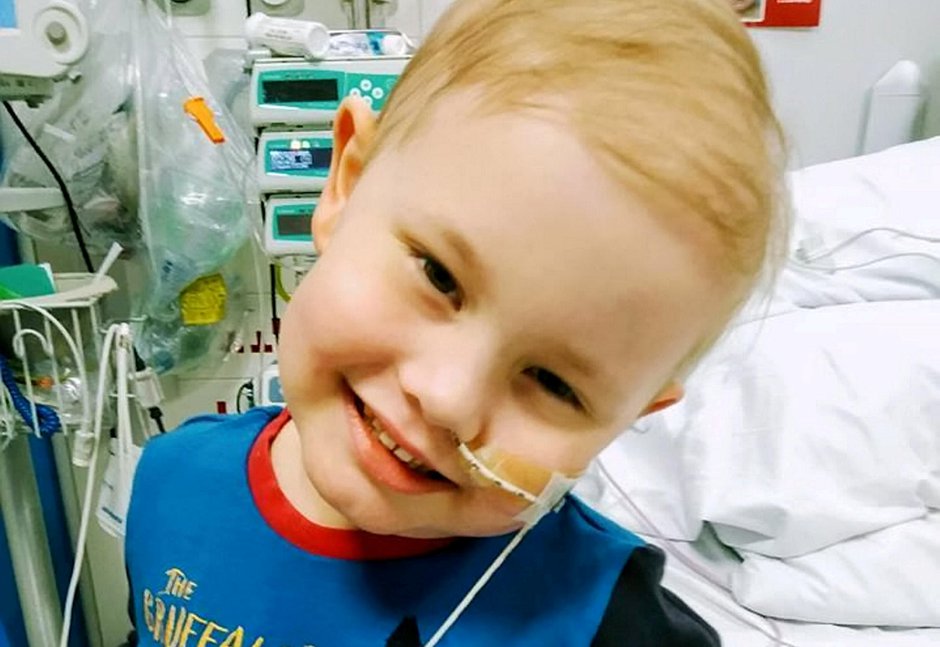 Image by: Olivia Saxelby
Image by: Olivia Saxelby
A five-year-old kid is heading to Singapore with his parents after kindhearted members of the public donated £500,000 to fund leukaemia treatment.
Oscar Saxelby-Lee will have CAR-T treatment after the community helped raise the funds to cover the cost of the treatment, which is not currently available on the NHS.
He will make the trip with his parents “in the next few days” following the successful crowdfunding campaign to pay for the potentially life-saving treatment.
Oscar’s mum Olivia Saxelby said: “Oscar is continuing to fight, but his disease hasn’t responded greatly to treatment in the UK involving a top up of donor cells he was given.
“It kept his disease level down to an extent, but it’s not what we had wished.
“It’s taken a few days to come to decision, not only because of the results, but the difficulty in knowing whether each option will cure him.
“All we want to do is the ‘right’ thing by our baby. So in the next few days we shall be on the plane to Singapore.
“We are scared, we are petrified, we just don’t know if this is the best option, but what we do know is Oscar was given this chance, and we must go for it before it’s too late.”
Oscar, from Worcester, first made headlines when more than 10,000 people responded to a plea for potential stem cell donors after doctors gave him three months to find a match.
After a match was found, Oscar’s parents Olivia, 26, and Jamie, 23, hoped it was the first step to curing their son who has a rare T-cell acute lymphoblastic leukaemia.
But they were left devastated when they discovered the disease had returned despite Oscar's stem cell transplant this spring.
They suffered further heartache when they were told the NHS would not fund a second transplant or a potentially new cell therapy treatment.
The desperate couple launched a fundraising drive to raise £500,000 needed to send Oscar to Singapore for the CAR-T trial.
 Image by: Olivia Saxelby
Image by: Olivia Saxelby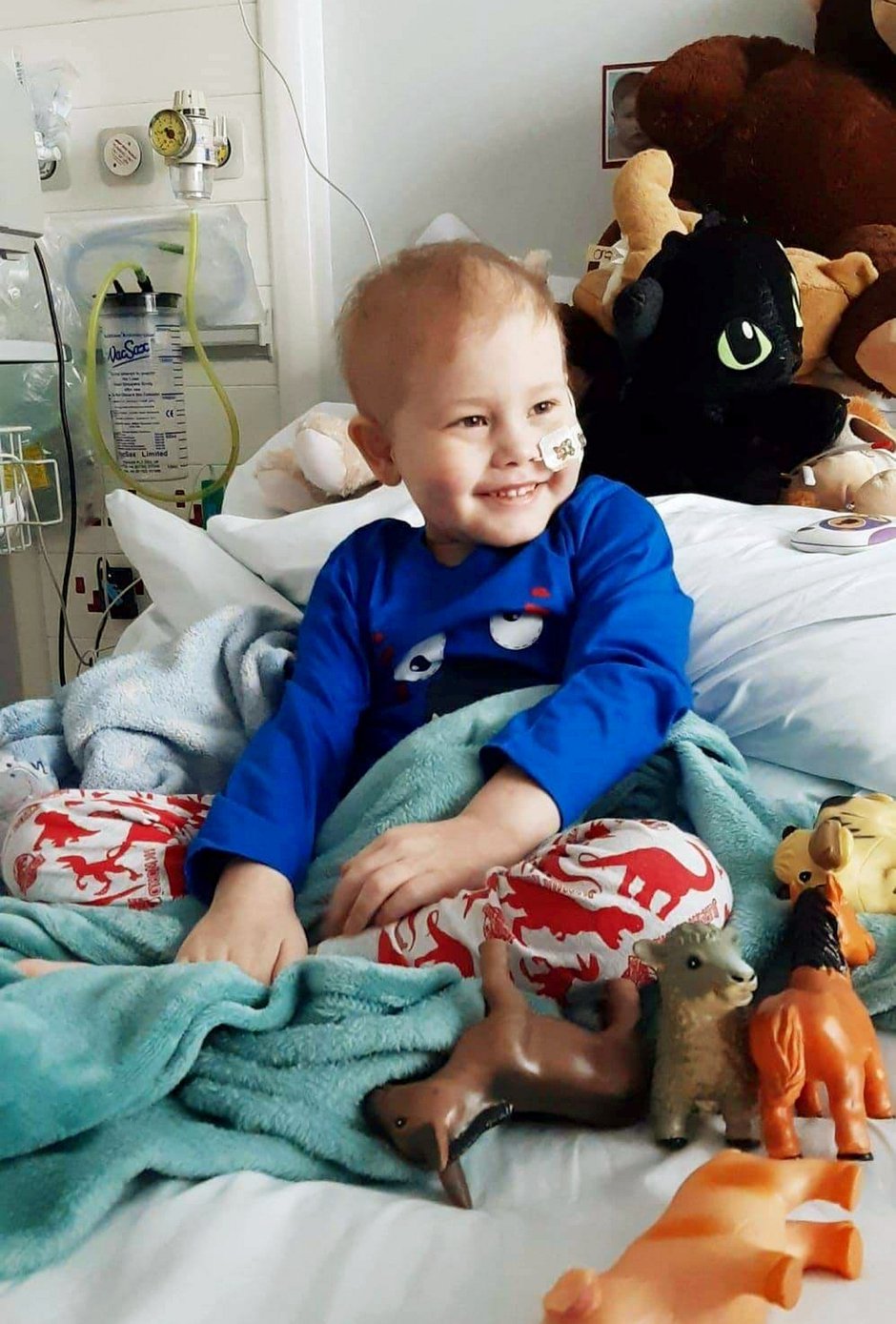 Image by: Olivia Saxelby
Image by: Olivia Saxelby Image by: David Dunbar
Image by: David Dunbar Image by: Newsquest Worcester News
Image by: Newsquest Worcester News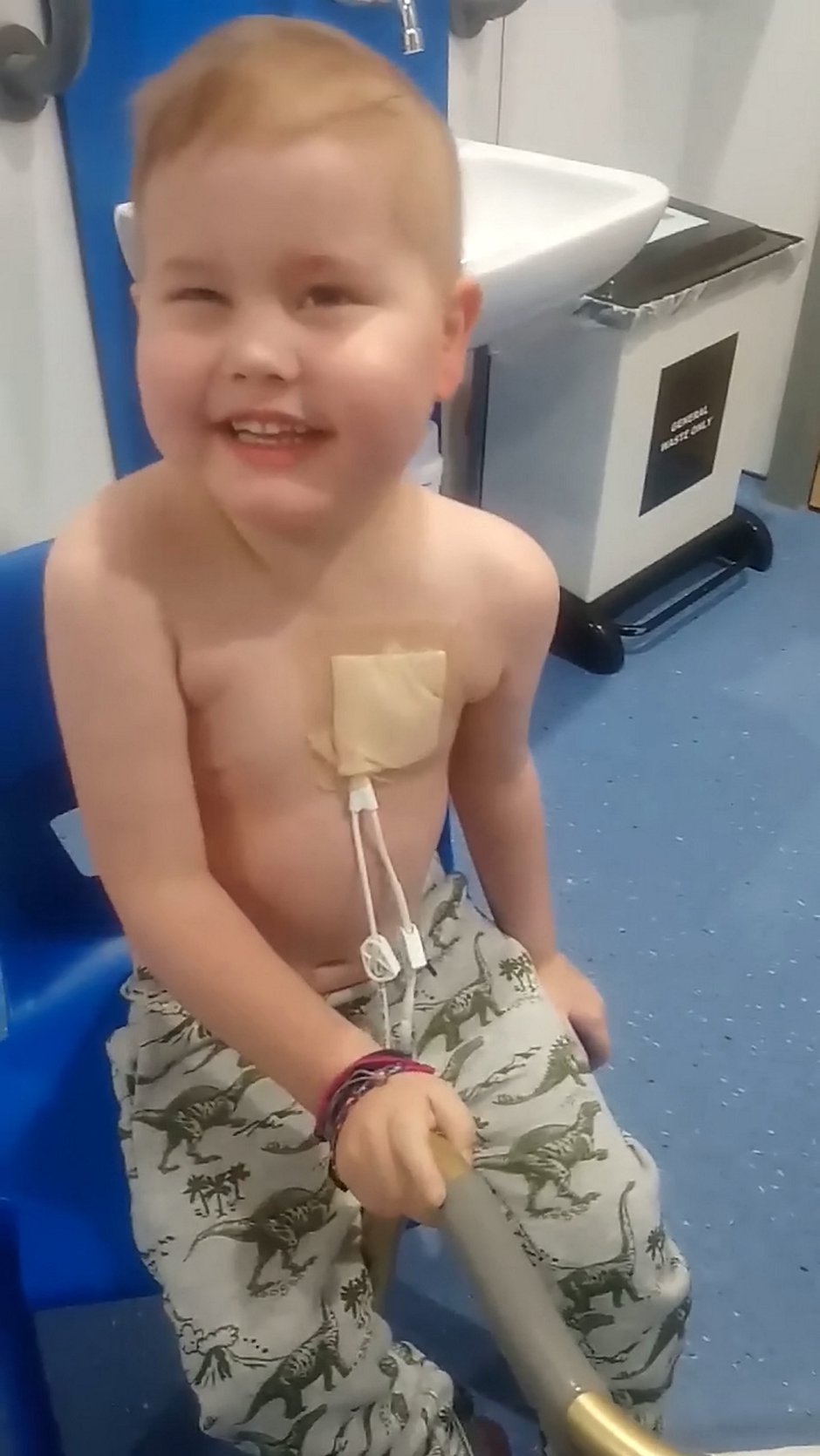 Image by: Olivia Saxelby
Image by: Olivia Saxelby
The campaign to raise half a million pounds to fund a specialist treatment for the brave five-year-old boy was one of the fastest online charity appeals, taking just three weeks.
In a post on their Facebook page, the family said: “Often we sit, no talk is needed, no eye contact is needed, just tears. Just that time to grieve.
“It’s not often but it happens. It happens because all we wish for is a ‘normal’, happy life without our baby suffering.
“Being strong, remaining positive is absolutely our way of coping but sometimes we do have to be realistic.
“All we want to do is the ‘right’ thing by our baby. Yet that is not something that you can’t determine during these traumatic times.”
Dr Jen Kelly, director of the Grace Kelly Childhood Cancer Trust said: “The team at the Grace Kelly Childhood Cancer Trust are proud to have been able to help support Oscar Saxelby-Lee and his parents, Olivia and Jamie through the most incredible fundraising campaign.
“We would like to wish them the very best of luck on this next step of their journey and to say we are rooting for Oscar all the way.
“The funds are ready, but we are currently working hard to sort the final details for the funding of Oscar’s treatment and are awaiting on the final paperwork from Singapore before transfers can take place.
“When this is received, we will be ready and waiting.
“Thank you so much to the people of Worcestershire for working together to help us give this wonderful little boy this chance.
“Grace’s legacy was a wish to help other children, and we are so proud to have been able to help support Oscar’s family in this way.
“We will continue to be in close contact with the family, helping where ever we can.”
WHAT A BALLS OP - A dad has waived his anonymity and spoken out as hospital bosses admitted a series of failings in a damning report after an op that led him to lose a TESTICLE
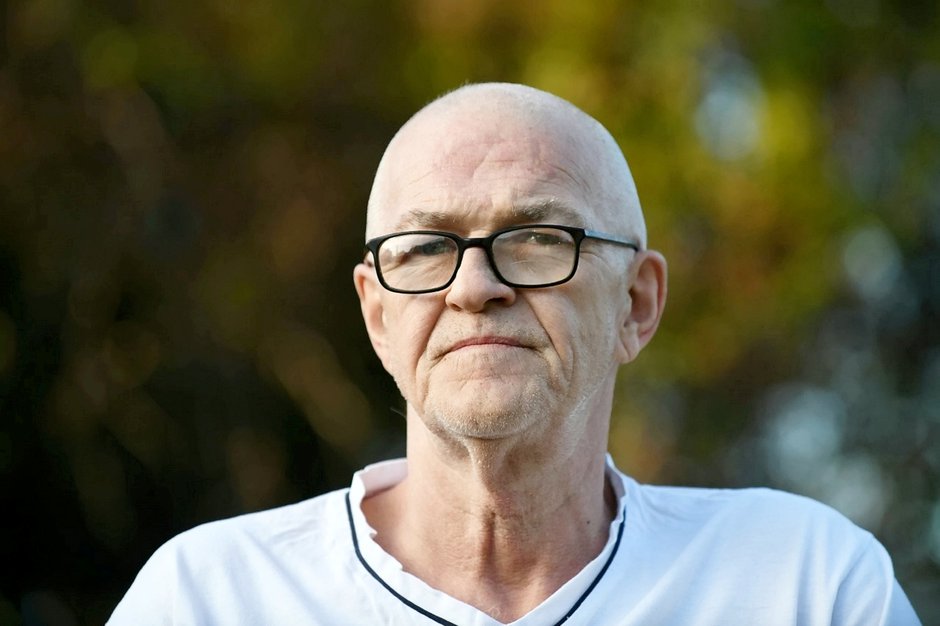 Image by: Newsquest The Mail Cumbria
Image by: Newsquest The Mail Cumbria
A dad has waived his anonymity and spoken out as hospital bosses admitted a series of failings in a damning report after an op that led him to lose a TESTICLE.
Bill Murray, 62, underwent a routine procedure at Furness General Hospital, Cumbria, in April to remove swelling from his scrotum.
The supposedly simple operation to drain the swollen testicle was carried out by consultant urologist Ashutosh Jain.
But, after the op, the dad-of-two woke up to find a vacuum drain had been inserted and left underneath the skin.
Bill said this was not checked or emptied for 24 hours.
Just two days later, in excruciating pain with the swelling having grown and his testicle now black and gangrenous, Bill, from Walney Island, asked to see a doctor and he was rushed back into theatre by a different surgeon.
When he woke up, he was shocked to see his right testicle was missing - as he claims he hadn't been told exactly what he was going back into theatre for.
The procedure, known as a hydrocele repair, typically takes around 30 minutes and rarely results in complications.
Although patients can usually go home on the same day as a hydrocele repair op, Bill had to stay in hospital for 12 days.
His first operation was carried out by under-fire consultant urologist Ashutosh Jain who has been responsible for other errors leading to patient harm and in two cases contributed to patient deaths.
Two other consultant urologists at the hospital - Kavinder Madhra and Muhammad Naseem - have also been responsible for errors over the last 18 years.
Mr Madhra resigned in October 2018 while Mr Naseem remains at the trust where he is clinical lead of the urology department.
It was only when Bill complained that the University Hospitals of Morecambe Bay NHS Foundation Trust launched an investigation and has this week handed him a damning Root Cause Analysis.
 Image by: Newsquest The Mail Cumbria
Image by: Newsquest The Mail Cumbria
The report reveals:
The serious incident by the second surgeon who discovered Bill's testicle was gangrenous.
There was a missed opportunity to do a bladder scan when Bill complained of pain and an inability to urinate.
He was not advised of the risks of the operation.
Policy wasn't followed in escalating Bill to the medical team when he began experiencing pain and other complications.
Finally, medical records from doctors’ assessments and ward rounds have since ‘gone missing’.
To Bill's further ‘disgust’ he has discovered the investigation was led by Mr Naseem.
He said: “I can’t believe they would allow one of the other highly-criticised urologists to be involved in the investigation into what happened to me.
“I’m absolutely disgusted. I hold the surgeon Mr Jain fully responsible for all this.”
UHMBT medical director Dr Shahedal Bari said: “We are very sorry for the distress the patient suffered, and for the length of time it has taken to complete this investigation.
“We have shared our findings with the patient and will remain in touch with him. We would be happy to meet the patient to discuss any concerns.
“An investigation like this involves committees chaired by UHMBT executives and our governance team who are not related to the clinical care.
"This process is governed by trust policies aligned with national guidelines.
"To ensure impartial discussion senior clinicians (Doctors, Nurses) and managers outside the departments are involved in checking (as a standard practice for any RCA).
“The process is not completed yet as an external review will be considered and team lessons will be discussed, in particular around improving record keeping and not missing opportunities to scan patients in this situation.”
A black man has alerted police after he was the victim of a racist attack when a Wetherspoon's customer used its app to send a BANANA to his table
 Image by: Mark D'Arcy-Smith
Image by: Mark D'Arcy-Smith
A black man has alerted police after a Wetherspoon's customer used its app to send a BANANA to his table.
Mark D'arcy-Smith was sat in The Richmal Crompton in Bromley in Kent with a friend when a waiter delivered the appalling order.
Bananas can be ordered for 30p on the pub chain's app and sent to any table in any Wetherspoon.
Shocked Mark, 24, soon left the pub saying staff didn't treat the incident seriously and has since contacted the police.
He now wants to speak out to raise awareness as he said the unpleasant incident left him feeling unwanted - in a place he'd previously felt at home.
He said: "It made me feel confused, angry, lost and lonely. It was really overwhelming. All these emotions came in a matter of seconds.
"I don't feel like many people understand what it feels like to be racially abused. The staff didn't take it seriously."
Mark had arrived in the pub with his friend at around 8:30pm on November 8 - a usual trip on a Friday.
The pair sat down and enjoyed a few drinks before the abhorrent order arrived at around 10:05pm.
Wetherspoon allows its customers to order food and drinks to tables using numbers on an app - meaning you can send items anywhere unidentified.
He said: "We both looked at each other then looked at the banana. It clicked that it wasn't ours. It was clearly sent by someone who was trying to be racist.
"My friend went to talk to a staff member but they didn't see what the issue was. He said: 'do you know what's wrong here?'.
"They thought they had brought an incorrect order. We had to explain what was wrong with that.
"I was sat on my own at this point. I looked around to see if I could spot anyone. I got anxious. I think someone sent it because it was anonymous.
"Two girls came over and asked if I was okay, if I was going to stay."
Gutted Mark says his pal then went up to a worker at the chain pub to complain - who claimed they didn't see what the issue was.
But Mark asked his friend if they could leave when he returned from talking to workers and the pair walked out.
 Image by: Mark D'Arcy-Smith
Image by: Mark D'Arcy-Smith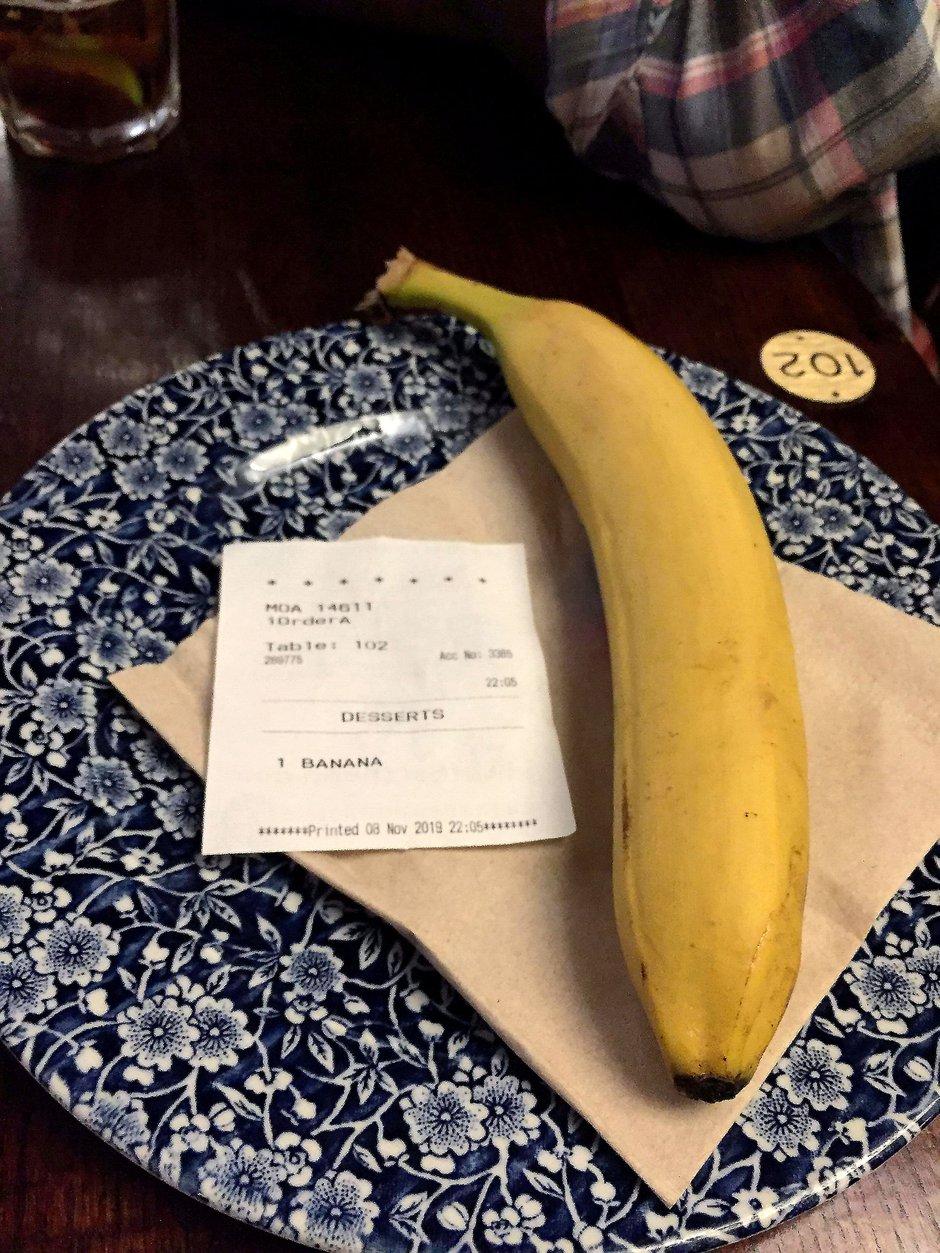 Image by: Mark D'Arcy-Smith
Image by: Mark D'Arcy-Smith
He said he returned to the pub the day after to complain again and ask what was being done but was met with a similar response - so then went to the police.
But even the memory of the horrible incident now gives Mark a bad feeling in a town he's lived in for many years.
He said: "When I walked past [the other day] I had this weird moment. My hands were shaking and my palms were sweating. I don't think I was very comfortable.
"I had hoped they [Wetherspoon] would take the situation seriously. They just treated it like other incidents - like a bar fight."
Football fan Mark added that he thinks a rise in racism in the beautiful game is fuelling the behaviour away from the stands.
A Wetherspoon spokesman said: "We apologise to the customer and appreciate the distress caused. This is now a police matter.
“We have responded to the customer and pointed out that the pub cannot be held responsible for app orders.”
A Wetherspoon spokesman said: “We apologise to the customer and appreciate the distress caused.
“This is now a police matter. We have responded to the customer and pointed out that the pub cannot be held responsible for app orders.”
A spokesperson for the Metropolitan Police said: "Police are investigating a racially aggravated public order offence.
''The offence happened at about 22:05hrs on Friday, 8 November at a Westmoreland Place, Bromley and involves an item being sent to the victim’s table.
"The matter was reported to police the next day. Officers from the South Area Command Unit investigated.
"No arrests. Enquiries continue."
I'LL NEVER LOLLI-STOP - Britain’s longest serving lollipop lady has no plans to hang up her stick – after an incredible 50 YEARS patrolling the same stretch of road
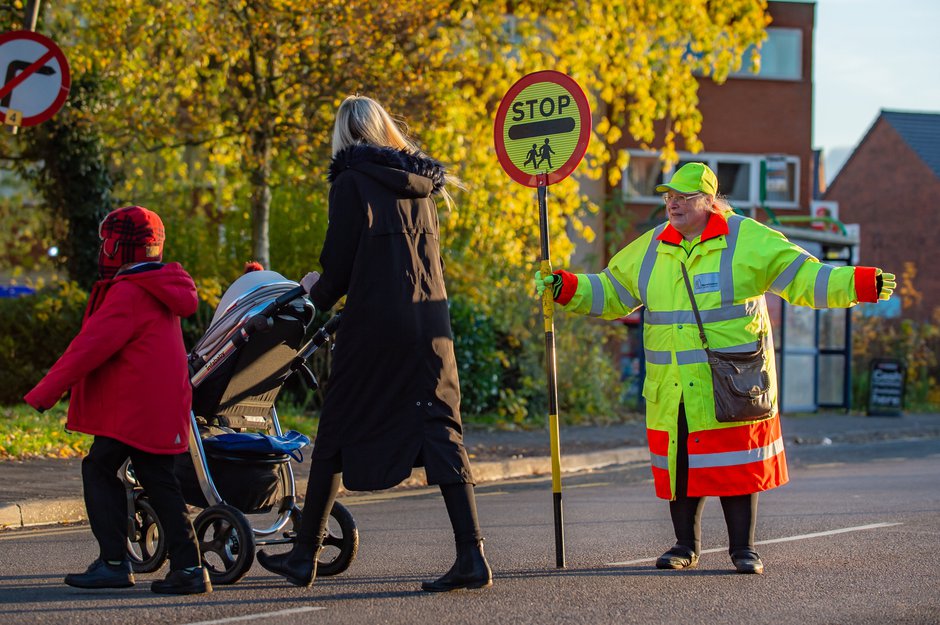 Image by: Adam Hughes SWNS
Image by: Adam Hughes SWNS
Britain’s longest serving lollipop lady has no plans to hang up her stick – after an incredible 50 YEARS patrolling the same stretch of road.
Ann Perry, 76, has been safely guiding children to and from Kingsbury School since 1969.
Every school day she walks a quarter-of-a-mile from home to do the morning crossing from 8.15am to 9am, and again in the afternoon from 3pm to 3.30pm.
She makes an average of 40 daily crossings of the 5m-wide road, meaning she’s covered over 1,250 miles carrying her lollipop stick back and forth over the years.
Ann started her job at the school in Warwickshire in September 1969 and has just celebrated her 50th year in the job.
She was presented with flowers by the non-selective secondary school as thanks for keeping its 900 pupils - and thousands more over the years - safe.
Ann, who has two grown up children and three grandchildren, says she has no plans to retire.
She said: “I’m very proud of my job and what I do.
“It is a good advert for the service that people can still do the job at this age.
“I’ve crossed some children, then their children and their grandchildren.
“I don’t plan to retire. I want to keep going. It’s the best job in the world.
“I've barely missed a day and when I have it’s been through illness and I’ve missed having the chats with the parents and the kids.
"I love just meeting people and watching the children grow up.
“They are polite and say ‘good morning’ and ‘thank you’ as they cross the road.
“The job’s the same as always but there’s more traffic now so the roads are more dangerous.
“You still hold the lollipop stick and stop the cars to let the children cross.
"I shouldn't really give my secrets away, but it's important to stay warm because you're out in all weathers.
"I've used hand warmers and little hot water bottles in my pockets."
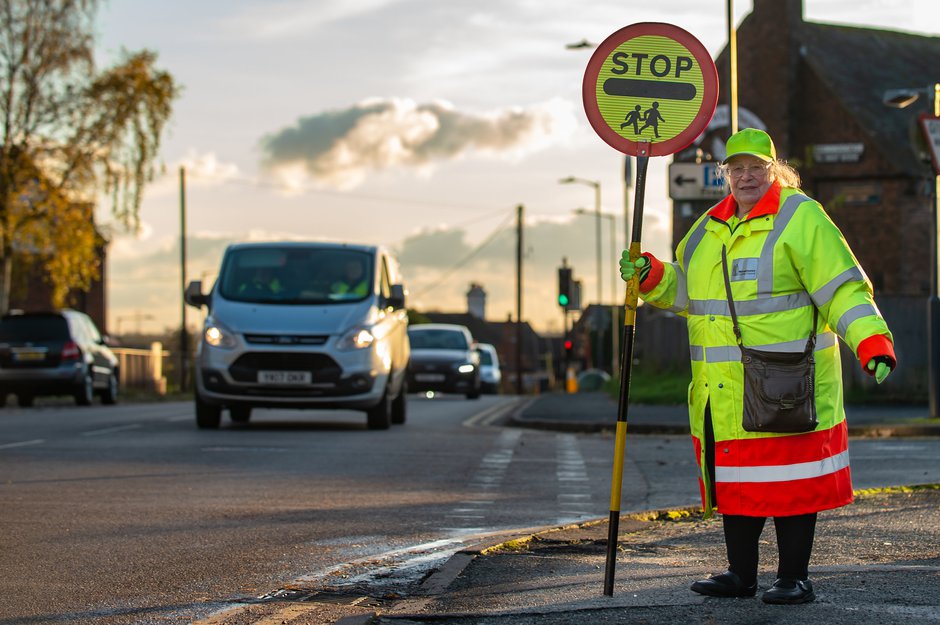 Image by: Adam Hughes SWNS
Image by: Adam Hughes SWNS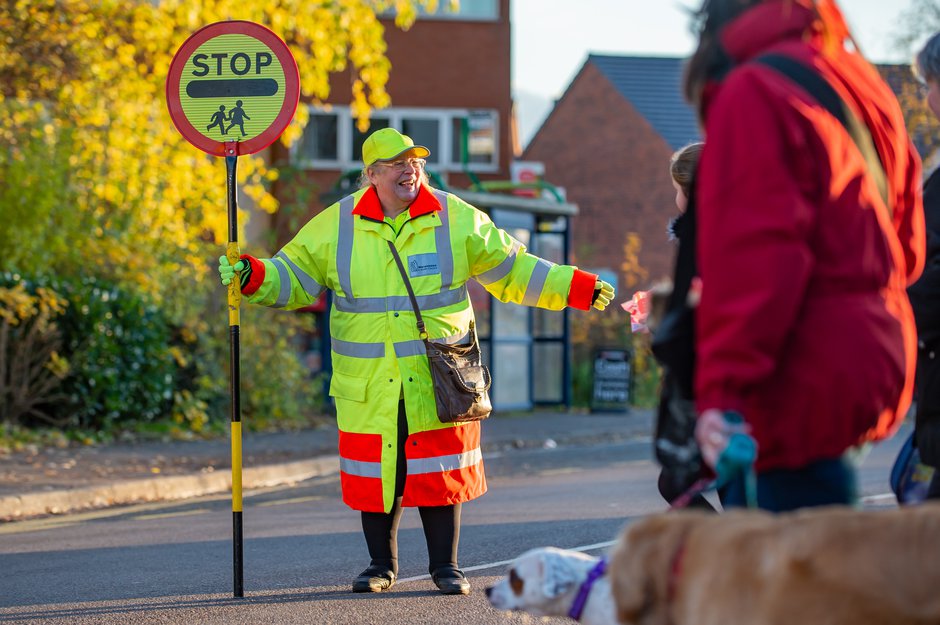 Image by: Adam Hughes SWNS
Image by: Adam Hughes SWNS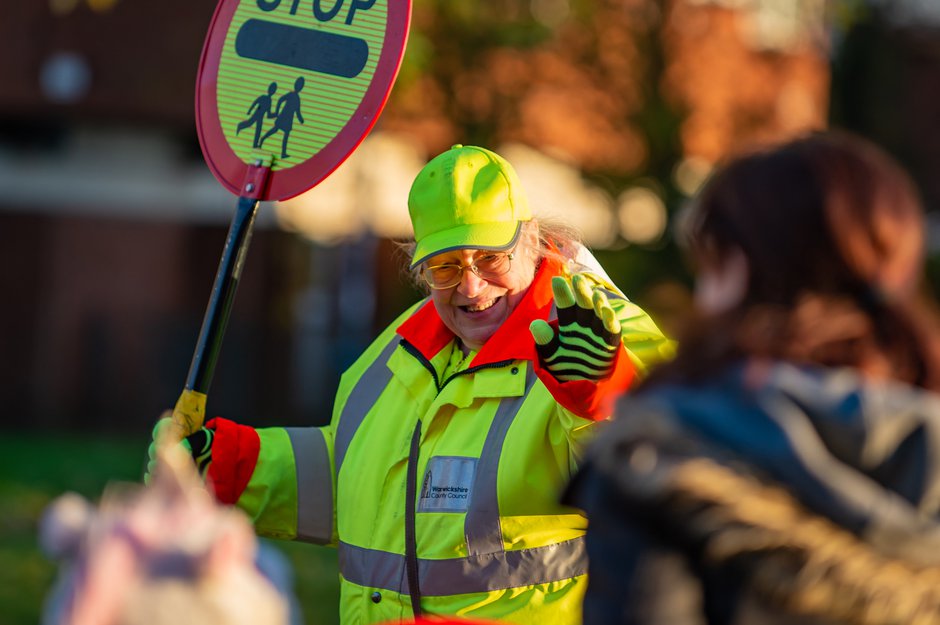 Image by: Adam Hughes SWNS
Image by: Adam Hughes SWNS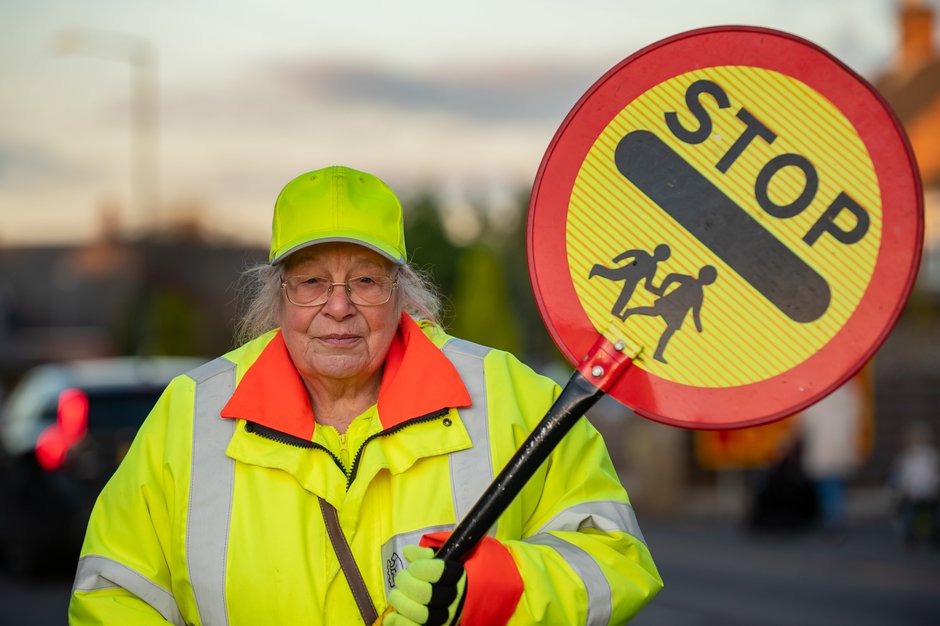 Image by: Adam Hughes SWNS
Image by: Adam Hughes SWNS
Ann, who is married to retired builder Bob, 81, started the job when her two children, Elaine and Robert, started at the school.
She said: “It was handy for me because I could take the children to school and then pick them up after my shift.
“When they left the school I just carried on. I never wanted to stop and I still don’t. No day is the same and people are always so friendly.”
As well as her road patrols, Ann also runs the Kingsbury Youth Club near her home.
Paying tribute to Ann, Kingsbury School headteacher, Martin Clarke said: “As a school
it’s important our students don’t take Ann for granted.
“We wanted to take the time to pay tribute and say thank you to her for keeping all our pupils safe.”
Rosalie Taylor, School Patrol Officer Supervisor at Warwickshire County Council said:
“Ann has been helping children to cross the roads safely for 50 years.
“This is an unbelievable achievement and I am sure that many adults who remember
Ann and all of the children she currently helps will agree that she is a very special person with a real passion for the job she does.
“Standing in all weathers is not an easy job, but Ann has always done it with a smile on her face and a commitment to keeping young people safe on their journey to school.
“Despite her 50 years’ service, Ann has no plans to stop just yet and we couldn’t be more proud.
“Thank you Ann for everything that you do, you really are one in a million.”
Video by: Adam Hughes SWNS




